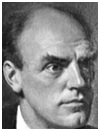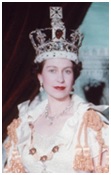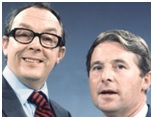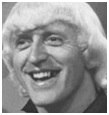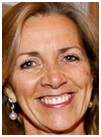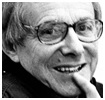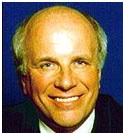|
 |
|
 |
|
|
||
BBC - Quality, Creativity and Customer Satisfaction
BBC
About the BBC (British Broadcasting Corporation)
It is owned by the British government but independently run by:
The BBC Trust makes sure that the BBC achieves its purpose to inform, educate and entertain (principles introduced by its first Director General, John Reith). Its TV channels and radio stations can’t advertise, so it is funded by TV licence payers. It had a monopoly in radio broadcasting until 1972 and in television until the launch of ITV (funded by advertising) in 1955. As a public service broadcaster, it has always prioritized the quality of its programmes.
Key events in the BBC's history 1922 BBC founded as a privately owned radio station with John Reith (pictured right) as its general manager.
1923 First edition of the Radio Times, the BBC's programmes guide.
1927 BBC founded as we know it today (as a government owned but independent corporation) John Reith appointed as the BBC's first Director General who made its mission to: 'inform, educate and entertain'
1932 Opening of Broadcasting House, from which the BBC broadcasted its programmes. Launch of BBC World Service. King George V gives the first royal Christmas broadcast (pictured right giving his 1934 broadcast).
1936 Launch of BBC television (the world's first regular hi-definition television service)
1951 First edition of the long running BBC radio soap opera, The Archers.
1953 BBC television's live broadcast of Queen Elizabeth II's coronation (pictured right in the official portrait).
1960 Opening of the BBC Television Centre.
1966 BBC's play, Cathy Come Home, highlights the problem of homelessness.
1967 Lauch of BBC radio's pop station, Radio 1.
1969 Launch of colour television. British comedy duo, Morecambe and Wise's (pictured right) first Christmas show (the 1977 show was the most popular British comedy programme ever with 28 million viewers).
1973 Jacob Bronowski's TV history of science, The Ascent of Man. 1979 David Attenborough's (pictured right) natural history TV programme, Life On Earth.
1985 First episode of BBC television's soap opera, Eastenders (the 1986 Christmas Day episode is the most popular British TV programme ever with 30 million viewers).
1997 Launch of the BBC's website, bbc.co.uk.
2002 Launch of BBC 4, the factual channel
2004 Hutton Inquiry criticizes the BBC's reporting of the Iraq War leading to the resignation of the Director General, Greg Dyke. 2012 BBC criticized for covering up sex abuse by its former TV and radio presenter, Jimmy Savile (pictured right in 1964 presenting Top of the Pops). BBC also wrongly accuses of Lord McAlpine of child abuse leading to the resignation of George Entwhistle (Director General for only 54 days)
Key people John (later Lord) Reith, first Director General 1927-38 Tony Hall, Director General since 2013. Rona Fairhead, Chairman of the BBC Trust since 2014 (pictured right).
Key quotes The BBC will live or die by the quality of its programmes and content, - Mark Thompson Director General 2004 - 2012 (pictured right).
Value for money is what matters – not to be the cheapest, but the most efficient for the quality we are trying to achieve. - Tony Hall, Director General.
We can actually afford the BBC because we can’t afford not to. - Stephen Fry, English broadcaster and writer (pictured right).
If you've got 10 people sitting on your shoulder you can't be good, you can't be creative. - Ken Loach, TV drama director, pictured right (talking about managers stifling creativity).
If you want organizations to change, you have to carry the staff with you. - Greg Dyke (speaking in 2000 as Director General). You have to love an organization in order to reform it. - John Tusa, ex-boss of the BBC World Service (pictured right).
What affects quality at the BBC?
1. Purpose The BBC’s mission is “to enrich people’s lives with programmes and services that inform, educate and entertain”. Its Royal Charter sets out six “public purposes” to achieve this mission:
a) sustaining citizenship and civil society (i.e. promoting responsible citizenship).
b) promoting education and learning
c) stimulating creativity and cultural excellence (particularly in the arts).
d) representing the UK, its nations (England, Scotland, Wales and Northern Ireland), regions and communities So programme production is being transferred away from London. For example, these have moved to Salford (near Manchester) from London:
e) bringing the UK to the world and the world to the UK So the BBC’s motto is “nation shall speak peace unto nation” The BBC World Service (its global, multi-language radio broadcasting service) is vital to achieving this aim.
f) delivering to the public the benefit of emerging communications technologies and services (e.g. the Internet). To achieve these aims, the BBC’s 2009 strategy review (called Putting Quality First) identified five priorities:
These non-commercial aims make the BBC a public service broadcaster. Because different people value different things, its main problem is finding the right balance between
Popular programmes must be made to justify everyone paying the licence fee (see point 2).
2. Customer satisfaction To satisfy its customers, the BBC must:
a) inform with integrity The BBC’s reputation has been built on the highest ethical and professional standards, so that people worldwide trust its
Its Charter says it should be “free from both political and commercial influence and answers only to its viewers and listeners”. Greg Dyke (pictured right) had to resign as Director General in 2004 after the Hutton Inquiry that resulted from a BBC journalist’s controversial claim that the government’s arguments for the Iraq War had been falsely exaggerated.
b) delivering value to all audiences The BBC isn’t so popular with:
It has to embrace these groups, or it will be damagingly portrayed as serving only a white middle class audience. Its pop radio station, Radio 1 is aimed at young people Its local radio and TV services are tailored to the needs of
c) quality with distinctiveness The BBC has a worldwide reputation for:
But these are expensive to produce and often have limited appeal. So it must also provide popular entertainment shows like Strictly Come Dancing - Dancing With the Stars in America. But quality programmes can be very popular such as:
d) online, digital and satellite broadcasting The BBC invests heavily in:
Hugely popular are its
In 2008 it also launched a subscription free satellite broadcasting service, Freesat, in partnership with ITV (Britain’s commercial TV channel).
3. Corporate culture (shared values and beliefs) Greg Dyke, when he was Director General (2000-2004), asked BBC employees what values the BBC stood for. These six values (including quality) are still supported by everyone at the BBC and will continue to be vital to its future success:
a) trust... is the foundation of the BBC: we are independent, impartial and honest. b) audiences... are the heart of everything we do.
c) We take pride... in delivering quality and value for money.
d) creativity... is the lifeblood of our organization (see point 4).
e) we respect... each other and celebrate our diversity so that everyone can give their best.
f) we are one BBC... great things happen when we work together. A staff survey in 2010 revealed that 45% of employees believed that managers’ actions weren’t consistent with these values This inconsistency wasn't helped by the fact that 38% thought that top managers didn’t communicate their strategies well enough.
4. Creativity Employee creativity is the BBC’s key core competency that gives it the edge over its competitors. So its vision is “to be the most creative organization in the world”. Creativity (and so programme quality) is increased by:
Creativity was hit in the 1990’s by the Director General, John Birt’s obsession with:
5. Money for quality programmes There is widespread criticism of the BBC for diverting money away from programme making by over paying its top managers In 2011 382 executives were paid more than £100,000 a year In 2014, Tony Hall, the Director General, put a cap on managers' severance payments after the deputy director
general Mark Byford received £949,000 when he left in 2011. Huge salaries are paid to star presenters (for example, Jeremy Clarkson, pictured right, the ex-presenter of Top Gear, the car programme, was paid £1 million a year). The BBC has also spread its limited resources too thinly. Since 2010, it has closed services like BBC Switch and BBC Blast (for teenagers). In 2014, Tony Hall, the Director General, announced that BBC3 will also be closed as an on-air channel and remain only online.
|
|
|
||
|
|
||
| Copyright © wisdomtowin.com 2025 All Rights Reserved | ||
|



